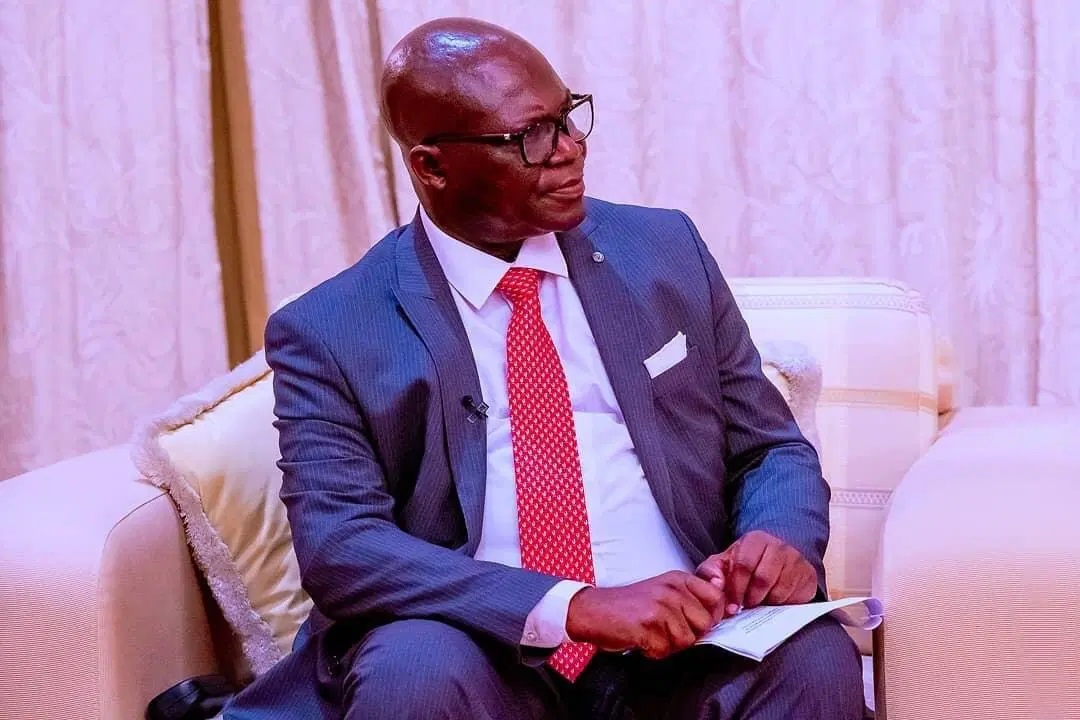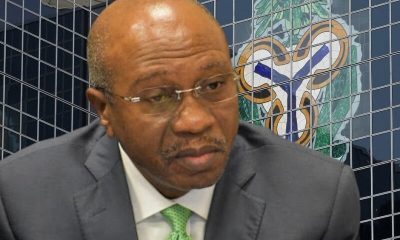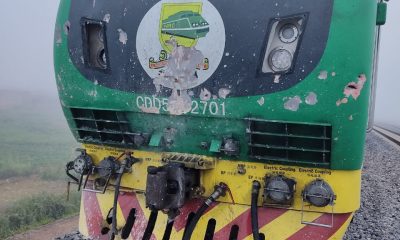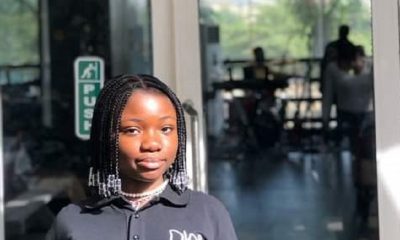Feature/OPED
The Spiritual Side Of Aso Villa

By Reuben Abati
People tend to be alarmed when the Nigerian Presidency takes certain decisions. They don’t think the decision makes sense.
Sometimes, they wonder if something has not gone wrong with the thinking process at that highest level of the country.
I have heard people insist that there is some form of witchcraft at work in the country’s seat of government.
I am ordinarily not a superstitious person, but working in the Villa, I eventually became convinced that there must be something supernatural about power and closeness to it. I’ll start with a personal testimony.
I was given an apartment to live in inside the Villa. It was furnished and equipped. But when my son, Michael arrived, one of my brothers came with a pastor who was supposed to stay in the apartment. But the man refused claiming that the Villa was full of evil spirits and that there would soon be a fire accident in the apartment.
He complained about too much human sacrifice around the Villa and advised that my family must never sleep overnight inside the Villa.
I thought the man was talking nonsense and he wanted the luxury of a hotel accommodation. But he turned out to be right.
The day I hosted family friends in that apartment and they slept overnight, there was indeed a fire accident. The guests escaped and they were so thankful. Not long after, the President’s physician living two compounds away had a fire accident in his home. He and his children could have died. He escaped with bruises.
Around the Villa while I was there, someone always died or their relations died. I can confirm that every principal officer suffered one tragedy or the other; it was as if you needed to sacrifice something to remain on duty inside that environment.
Even some of the women became merchants of dildo because they had suffered a special kind of death in their homes (I am sorry to reveal this) and many of the men complained about something that had died below their waists too.
The ones who did not have such misfortune had one ailment or the other that they had to nurse. From cancer to brain and prostate surgery and whatever, the Villa was a hospital full of agonizing patients.
I recall the example of one particular man, an asset to the Jonathan Presidency who practically ran away from the Villa.
He said he needed to save his life. He was quite certain that if he continued to hang around, he would die. I can’t talk about colleagues who lost daughters and sons, brothers and uncles, mothers and fathers, and the many obituaries that we issued.
Even the President was multiply bereaved. His wife, Mama Peace was in and out of hospital at a point, undergoing many surgeries.
You may have forgotten but after her husband lost the election and he conceded victory, all her ailments vanished, all scheduled surgeries were found to be no longer necessary and since then she has been hale and hearty.
By the same token, all those our colleagues who used to come to work to complain about a certain death beneath their waists and who relied on videos and other instruments to entertain wives (take it easy boys, I don’t mean nay harm, I am writing!), have all experienced a re-awakening.
Everyone who went under the blade has received miraculous healing, and we are happy to be out of that place. But others were not so lucky. They died.
There were days when convoys ran into ditches and lives were lost.
In Norway, our helicopter almost crashed into a mountain. That was the first time I saw the President panicking. The weather was all so hazy and he just kept saying it would not be nice for the President of a country to die in a helicopter crash due to pilot miscalculations.
The President went into a prayer mode. We survived.
In Kenya once, we had a bird strike. The plane had to be recalled and we were already airborne with the plane acting like it would crash.
During the 2015 election campaigns, our aircraft refused to start on more than one occasion. The aircraft just went dead.
On some other occasions, we were stoned and directly targeted for evil. I really don’t envy the people who work in Aso Villa, the seat of Nigeria’s Presidency.
For about six months, I couldn’t even breathe properly. For another two months, I was on crutches. But I considered myself far luckier than the others who were either nursing a terminal disease or who could not get it up.
When Presidents make mistakes, they are probably victims of a force higher than what we can imagine.
Every student of Aso Villa politics would readily admit that when people get in there, they actually become something else.
They act like they are under a spell. When you issue a well- crafted statement, the public accepts it wrongly.
When the President makes a speech and he truly means well, the speech is interpreted wrongly by the public.
When a policy is introduced, somehow, something just goes wrong.
In our days, a lot of people used to complain that the APC people were fighting us spiritually and that there was a witchcraft dimension to the governance process in Nigeria.
But the APC folks now in power are dealing with the same demons.
Since Buhari government assumed office, it has been one mistake after another. Those mistakes don’t look normal, the same way they didn’t look normal under President Jonathan.
I am therefore convinced that there is an evil spell enveloping this country. We need to rescue Nigeria from the forces of darkness.
Aso Villa should be converted into a spiritual museum, and abandoned.
Should I become President of Nigeria tomorrow, I will build a new Presidential Villa: a Villa that will be dedicated to the all-conquering Almighty, and where powers and principalities cannot hold sway.
But it is not about buildings and space, not so? It is about the people who go to the highest levels in Nigeria.
I really don’t quite believe in superstitions, but I am tempted to suggest that this is indeed a country in need of prayers.
We should pray before people pack their things into Aso Villa. We should ask God to guide us before we appoint ministers. We should, to put it in technocratic language, advice that the people should be very vigilant.
We have all failed so far, that crucial test of vigilance. We should have a Presidential Villa where a President can afford to be human and free.
In the White House, in the United States, Presidents live like normal human beings. In Aso Villa, that is impossible. They’d have to surround themselves with cooks from their villages, bodyguards from their mother’s clans and friends they can trust.
It should be possible to be President of Nigeria without having to look behind one’s shoulders. But we are not yet there. So, how do we run a Presidency where the man in the saddle can only drink water served by his kinsman? No. How can we possibly run a Presidency where every President proclaims faith in Nigeria but they are better off in the company of relatives and kinsmen. No. We need as Presidents men and women who are willing to be Nigerians. No Nigerian President should be in spiritual bondage because he belongs to all of us and to nobody.
Now let me go back to the spiritual dimension. A colleague once told me that I was the most naïve person around the place. I thought I was a bright, smart, professional doing my bit and enjoying the President’s confidence. I spelled it out. But what I got in response was that I was coming to the villa using Lux soap, but that most people around the place always bathed in the morning with blood. Goat blood. Ram blood. Whatever animal blood. I argued. He said there were persons in the Villa walking upside down, head to the ground. I screamed. Everybody looked normal to me. But I soon began to suspect that I was in a strange environment indeed.
Every position change was an opportunity for warfare. Civil servants are very nice people; they obey orders, but they are not very nice when they fight over personal interests.
The President is most affected by the atmosphere around him. He can make wrong decisions based on the cloud of evil around him. Even when he means well and he has taken time to address all possible outcomes, he could get on the wrong side of the public.
A colleague called me one day and told me a story about how a decision had been taken in the spiritual realm about the Nigerian government.
He talked about the spirit of error, and how every step taken by the administration would appear to the public like an error. He didn’t resign on that basis but his words proved prophetic.
I see the same story being re-enacted. Aso Villa is in urgent need of redemption. I never slept in the apartment they gave me in that Villa for an hour.
Feature/OPED
How Christians Can Stay Connected to Their Faith During This Lenten Period

It’s that time of year again, when Christians come together in fasting and prayer. Whether observing the traditional Lent or entering a focused period of reflection, it’s a chance to connect more deeply with God, and for many, this season even sets the tone for the year ahead.
Of course, staying focused isn’t always easy. Life has a way of throwing distractions your way, a nosy neighbour, a bus driver who refuses to give you your change, or that colleague testing your patience. Keeping your peace takes intention, and turning off the noise and staying on course requires an act of devotion.
Fasting is meant to create a quiet space in your life, but if that space isn’t filled with something meaningful, old habits can creep back in. Sustaining that focus requires reinforcement beyond physical gatherings, and one way to do so is to tune in to faith-based programming to remain spiritually aligned throughout the period and beyond.
On GOtv, Christian channels such as Dove TV channel 113, Faith TV and Trace Gospel provide sermons, worship experiences and teachings that echo what is being practised in churches across the country.
From intentional conversations on Faith TV on GOtv channel 110 to true worship on Trace Gospel on channel 47, these channels provide nurturing content rooted in biblical teaching, worship, and life application. Viewers are met with inspiring sermons, reflections on scripture, and worship sessions that help form a rhythm of devotion. During fasting periods, this kind of consistent spiritual input becomes a source of encouragement, helping believers stay anchored in prayer and mindful of God’s presence throughout their daily routines.
To catch all these channels and more, simply subscribe, upgrade, or reconnect by downloading the MyGOtv App or dialling *288#. You can also stream anytime with the GOtv Stream App.
Plus, with the We Got You offer, available until 28th February 2026, subscribers automatically upgrade to the next package at no extra cost, giving you access to more channels this season.
Feature/OPED
Turning Stolen Hardware into a Data Dead-End

By Apu Pavithran
In Johannesburg, the “city of gold,” the most valuable resource being mined isn’t underground; it’s in the pockets of your employees.
With an average of 189 cellphones reported stolen daily in South Africa, Gauteng province has become the hub of a growing enterprise risk landscape.
For IT leaders across the continent, a “lost phone” is rarely a matter of a misplaced device. It is frequently the result of a coordinated “snatch and grab,” where the hardware is incidental, and corporate data is the true objective.
Industry reports show that 68% of company-owned device breaches stem from lost or stolen hardware. In this context, treating mobile security as a “nice-to-have” insurance policy is no longer an option. It must function as an operational control designed for inevitability.
In the City of Gold, Data Is the Real Prize
When a fintech agent’s device vanishes, the $300 handset cost is a rounding error. The real exposure lies in what that device represents: authorised access to enterprise systems, financial tools, customer data, and internal networks.
Attackers typically pursue one of two outcomes: a quick wipe for resale on the secondary market or, far more dangerously, a deep dive into corporate apps to extract liquid assets or sellable data.
Clearly, many organisations operate under the dangerous assumption that default manufacturer security is sufficient. In reality, a PIN or fingerprint is a flimsy barrier if a device is misconfigured or snatched while unlocked. Once an attacker gets in, they aren’t just holding a phone; they are holding the keys to copy data, reset passwords, or even access admin tools.
The risk intensifies when identity-verification systems are tied directly to the compromised device. Multi-Factor Authentication (MFA), widely regarded as a gold standard, can become a vulnerability if the authentication factor and the primary access point reside on the same compromised device. In such cases, the attacker may not just have a phone; they now have a valid digital identity.
The exposure does not end at authentication. It expands with the structure of the modern workforce.
65% of African SMEs and startups now operate distributed teams. The Bring Your Own Device (BYOD) culture has left many IT departments blind to the health of their fleet, as personal devices may be outdated or jailbroken without any easy way to know.
Device theft is not new in Africa. High-profile incidents, including stolen government hardware, reinforce a simple truth: physical loss is inevitable. The real measure of resilience is whether that loss has any residual value. You may not stop the theft. But you can eliminate the reward.
Theft Is Inevitable, Exposure is Not
If theft cannot always be prevented, systems must be designed so that stolen devices yield nothing of consequence. This shift requires structured, automated controls designed to contain risk the moment loss occurs.
Develop an Incident Response Plan (IRP)
The moment a device is reported missing, predefined actions should trigger automatically: access revocation, session termination, credential reset and remote lock or wipe.
However, such technical playbooks are only as fast as the people who trigger them. Employees must be trained as the first line of defence —not just in the use of strong PINs and biometrics, but in the critical culture of immediate reporting. In high-risk environments, containment windows are measured in minutes, not hours.
Audit and Monitor the Fleet Regularly
Control begins with visibility. Without a continuous, comprehensive audit, IT teams are left responding to incidents after damage has occurred.
Opting for tools like Endpoint Detection and Response (EDR) allows IT teams to spot subtle, suspicious activities or unusual access attempts that signal a compromised device.
Review Device Security Policies
Security controls must be enforced at the management layer, not left to user discretion. Encryption, patch updates and screen-lock policies should be mandatory across corporate devices.
In BYOD environments, ownership-aware policies are essential. Corporate data must remain governed by enterprise controls regardless of device ownership.
Decouple Identity from the Device
Legacy SMS-based authentication models introduce avoidable risk when the authentication channel resides on the compromised handset. Stronger identity models, including hardware tokens, reduce this dependency.
At the same time, native anti-theft features introduced by Apple and Google, such as behavioural theft detection and enforced security delays, add valuable defensive layers. These controls should be embedded into enterprise baselines rather than treated as optional enhancements.
When Stolen Hardware Becomes Worthless
With POPIA penalties now reaching up to R10 million or a decade of imprisonment for serious data loss offences, the Information Regulator has made one thing clear: liability is strict, and the financial fallout is absolute. Yet, a PwC survey reveals a staggering gap: only 28% of South African organisations are prioritising proactive security over reactive firefighting.
At the same time, the continent is battling a massive cybersecurity skills shortage. Enterprises simply do not have the boots on the ground to manually patch every vulnerability or chase every “lost” terminal. In this climate, the only viable path is to automate the defence of your data.
Modern mobile device management (MDM) platforms provide this automation layer.
In field operations, “where” is the first indicator of “what.” If a tablet assigned to a Cape Town district suddenly pings on a highway heading out of the city, you don’t need a notification an hour later—you need an immediate response. An effective MDM system offers geofencing capabilities, automatically triggering a remote lock when devices breach predefined zones.
On Supervised iOS and Android Enterprise devices, enforced Factory Reset Protection (FRP) ensures that even after a forced wipe, the device cannot be reactivated without organisational credentials, eliminating resale value.
For BYOD environments, we cannot ignore the fear that corporate oversight equates to a digital invasion of personal lives. However, containerization through managed Work Profiles creates a secure boundary between corporate and personal data. This enables selective wipe capabilities, removing enterprise assets without intruding on personal privacy.
When integrated with identity providers, device posture and user identity can be evaluated together through multi-condition compliance rules. Access can then be granted, restricted, or revoked based on real-time risk signals.
Platforms built around unified endpoint management and identity integration enable this model of control. At Hexnode, this convergence of device governance and identity enforcement forms the foundation of a proactive security mandate. It transforms mobile fleets from distributed risk points into centrally controlled assets.
In high-risk environments, security cannot be passive. The goal is not recovery. It is irrelevant, ensuring that once a device leaves authorised hands, it holds no data, no identity leverage, and no operational value.
Apu Pavithran is the CEO and founder of Hexnode
Feature/OPED
Daniel Koussou Highlights Self-Awareness as Key to Business Success

By Adedapo Adesanya
At a time when young entrepreneurs are reshaping global industries—including the traditionally capital-intensive oil and gas sector—Ambassador Daniel Koussou has emerged as a compelling example of how resilience, strategic foresight, and disciplined execution can transform modest beginnings into a thriving business conglomerate.
Koussou, who is the chairman of the Nigeria Chapter of the International Human Rights Observatory-Africa (IHRO-Africa), currently heads the Committee on Economic Diplomacy, Trade and Investment for the forum’s Nigeria chapter. He is one of the young entrepreneurs instilling a culture of nation-building and leadership dynamics that are key to the nation’s transformation in the new millennium.
The entrepreneurial landscape in Nigeria is rapidly evolving, with leaders like Koussou paving the way for innovation and growth, and changing the face of the global business climate. Being enthusiastic about entrepreneurship, Koussou notes that “the best thing that can happen to any entrepreneur is to start chasing their dreams as early as possible. One of the first things I realised in life is self-awareness. If you want to connect the dots, you must start early and know your purpose.”
Successful business people are passionate about their business and stubbornly driven to succeed. Koussou stresses the importance of persistence and resilience. He says he realised early that he had a ‘calling’ and pursued it with all his strength, “working long weekends and into the night, giving up all but necessary expenditures, and pressing on through severe setbacks.”
However, he clarifies that what accounted for an early success is not just tenacity but also the ability to adapt, to recognise and respond to rapidly changing markets and unexpected events.
Ambassador Koussou is the CEO of Dau-O GIK Oil and Gas Limited, an indigenous oil and natural gas company with a global outlook, delivering solutions that power industries, strengthen communities, and fuel progress. The firm’s operations span exploration, production, refining, and distribution.
Recognising the value of strategic alliances, Koussou partners with business like-minds, a move that significantly bolsters Dau-O GIK’s credibility and capacity in the oil industry. This partnership exemplifies the importance of building strong networks and collaborations.
The astute businessman, who was recently nominated by the African Union’s Agenda 2063 as AU Special Envoy on Oil and Gas (Continental), admonishes young entrepreneurs to be disciplined and firm in their decision-making, a quality he attributed to his success as a player in the oil and gas sector. By embracing opportunities, building strong partnerships, and maintaining a commitment to excellence, Koussou has not only achieved personal success but has also set a benchmark for future generations of African entrepreneurs.
His journey serves as a powerful reminder that with determination and vision, success is within reach.
-

 Feature/OPED6 years ago
Feature/OPED6 years agoDavos was Different this year
-
Travel/Tourism10 years ago
Lagos Seals Western Lodge Hotel In Ikorodu
-

 Showbiz3 years ago
Showbiz3 years agoEstranged Lover Releases Videos of Empress Njamah Bathing
-

 Banking8 years ago
Banking8 years agoSort Codes of GTBank Branches in Nigeria
-

 Economy3 years ago
Economy3 years agoSubsidy Removal: CNG at N130 Per Litre Cheaper Than Petrol—IPMAN
-

 Banking3 years ago
Banking3 years agoSort Codes of UBA Branches in Nigeria
-

 Banking3 years ago
Banking3 years agoFirst Bank Announces Planned Downtime
-

 Sports3 years ago
Sports3 years agoHighest Paid Nigerian Footballer – How Much Do Nigerian Footballers Earn






















